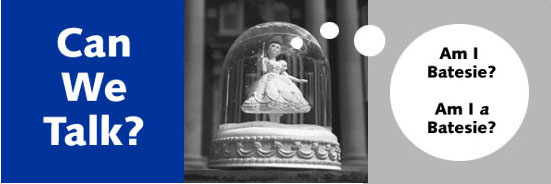Can we talk?

By Alana Watkins ’99
A first-year student has a lot to learn: which building is which, who the professors are, where the parties are, and how to get into your mailbox. You wouldn’t think that first-years would also worry about learning a new language, but they do.
The language? Bates lingo.
The concept is not a foreign one to campuses and colleges. Living in a tight-knit community leads to development of inside words, phrases, or names unique to that community. And Bates is no exception.
“That’s part of human nature to make yourself feel comfortable in a place so that it has meaning to you as a part of a community,” said former Bates football coach Web Harrison ’63 of Auburn, who is believed to have coined one of the great and enduring Bates phrases of recent years, the celebratory cheer “It’s a great day to be a Bobcat!” (See glossary.)
Offering an academic agreement is Professor of English Carole Taylor. According to Taylor, who has studied linguistics, two kinds of languages can develop in a community: natural and artificial. A natural language is connected to a group of people in a specific region for a significant period of time, whereas an artificial language has no group you can identify by place or from generation to generation.
“An artificial language is one that people would just sit down and make up, like Esperanto or pig Latin, and unlike a natural language, an artificial language dies readily,” Taylor said. “Natural language has to do with actual relationships among people.”
What’s unique about college lingo is that the language is neither artificial nor natural, yet has elements of both. “College is an artificial community, in that you’re only here for four years,” Taylor said. “But there is something natural about it because you pass it along through contact. It passes from generation to generation so that you can track the change.”
And change there is. Commons is still Commons and the Puddle is still the Puddle, but other phrases and words have changed in the last 35 years, most notably the word “Batesie.”
If a Bates student walked down a Boston street and saw a person in a Bates sweatshirt, the fond thought would be, “There’s a Batesie.” But if you were on campus in 1962, you might take slight offense at being described as “Batesie.” “My sense is that it had the slightest negative connotation, that it was just a little too much,” Harrison said.
The old “Batesie” was more of an adjective, whereas now it’s used as a noun. The new definition of a Batesie means you’re a comrade; back then, it might mean you were a goody-two-shoes.
“If you were a Batesie, you did what you were supposed to do, you followed the rules,” Associate Dean of Admissions Virginia Harrison ’63 said. “You were not particularly exciting or cool.”
Part of the reason “Batesie” became a slightly pejorative word was that there were a lot of rules to follow at Bates — particularly for women — in the early and mid-1960s.
“Men had no rules and the women had all the rules, so people who played by the rules were Batesie,” said Rae Harper Garcelon ’62, former director of alumni relations. “There was sarcasm to the word, but not in a cruel way.”
There have been changes on campus — fewer rules, for one. The word remains, but now has a different meaning as we carry on the “natural” language of our Bates predecessors. Some words and phrases, however, whip into and out of the College consciousness, particularly among sports teams.
“In the ’80s, everyone was a ‘dog’ and that was a phase, and then people were ‘houses,'” Harrison said. “I think you pick up on it, as long as you’re around it.”
“It’s the language of a youth that prizes novelty, newness, and self-definition,” Taylor said. “Any language of any group of self-definition, identity construction, or popularity changes quickly. Adult language changes over time, too, but not as quickly.”
So, perhaps you were initiated into the Bates lingo by your junior advisor or the captain of your athletic team and you passed it along when you took their place. Perhaps it made you feel the camaraderie of Bates, but chances are those phrases may mean something totally different — or may not exist at all — 10 years from now. A piece of advice: call your classmates Batesies, but don’t call a ’62 alum Batesie.